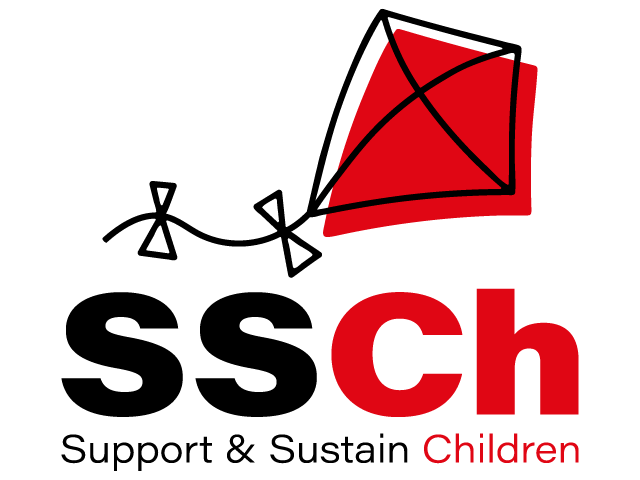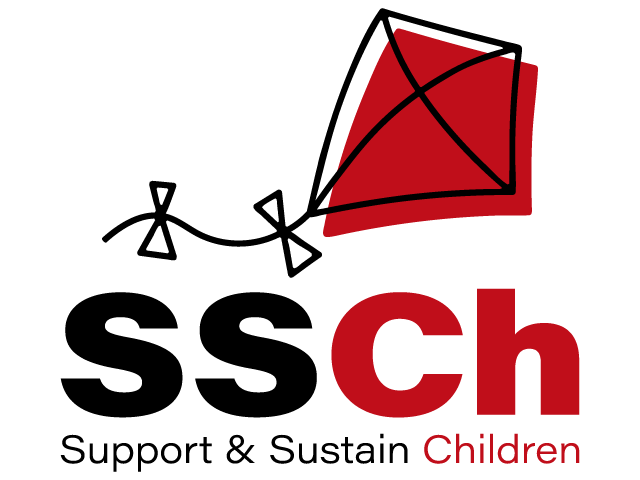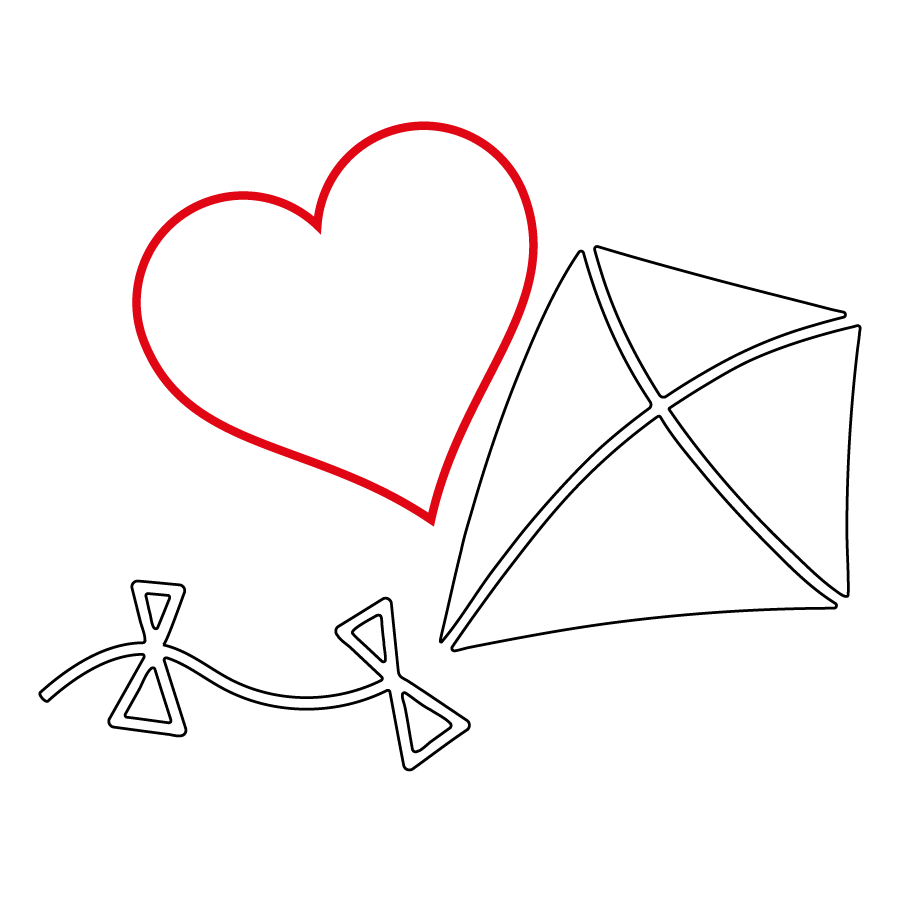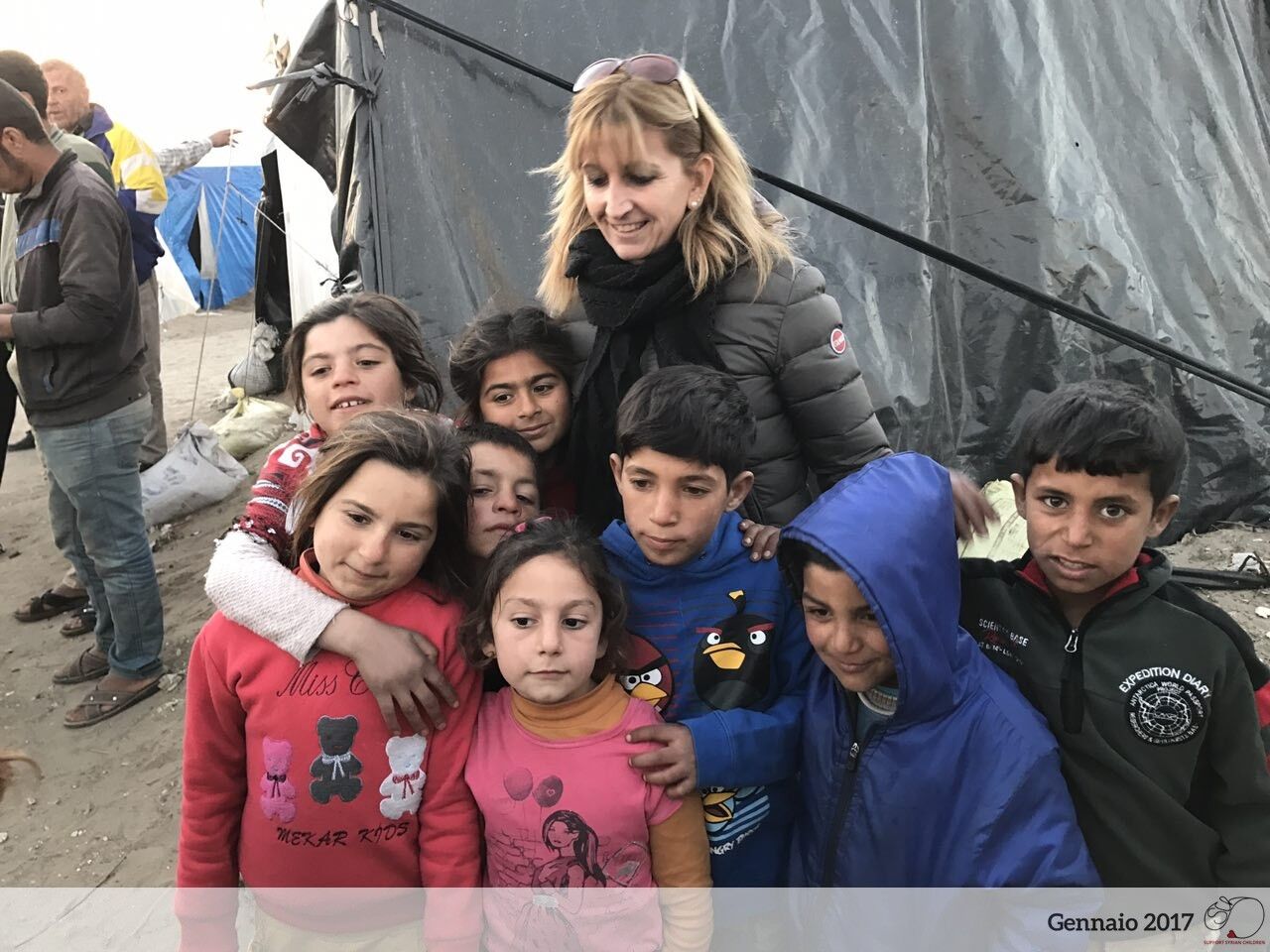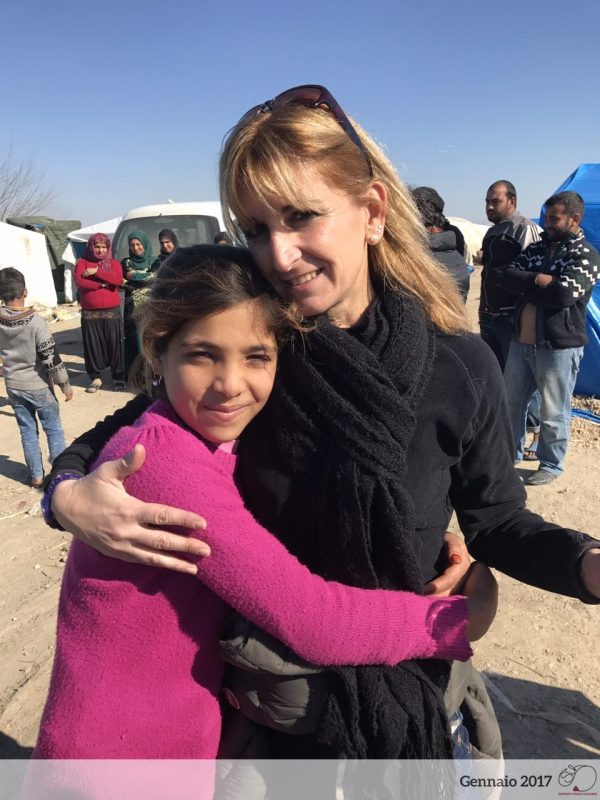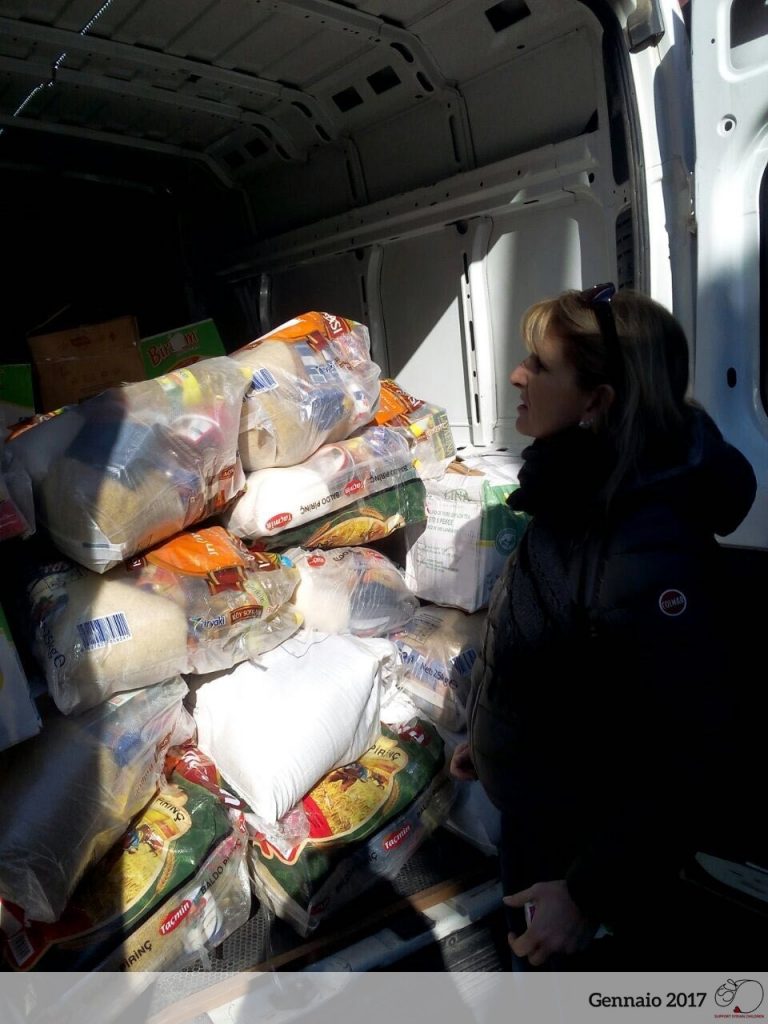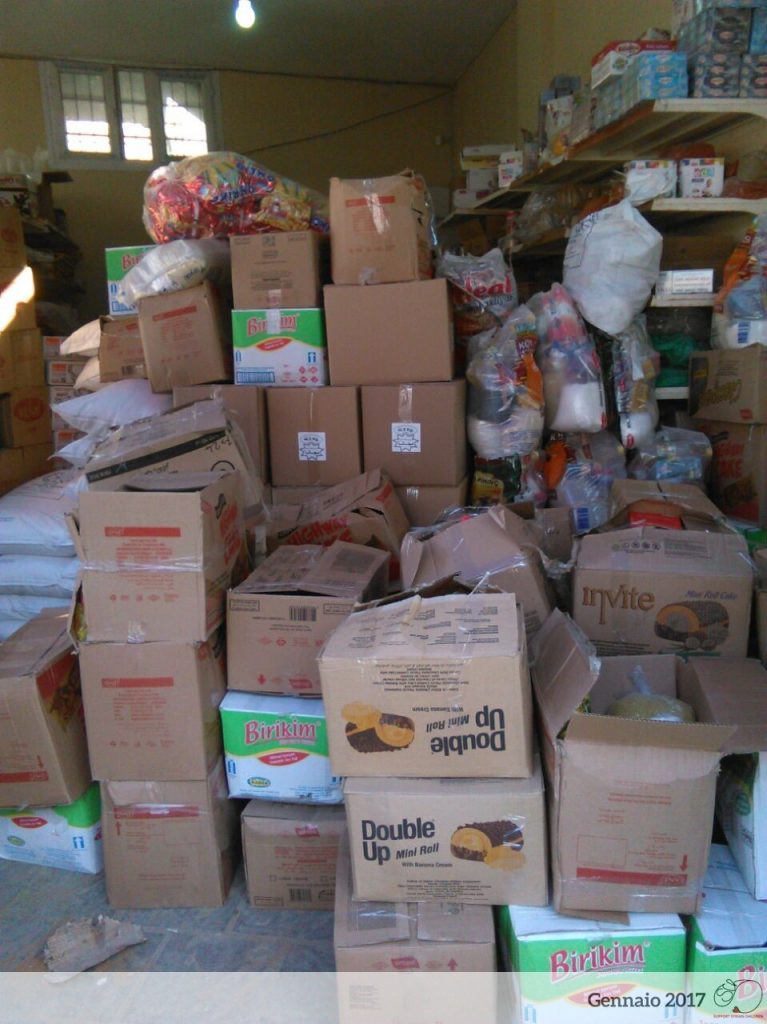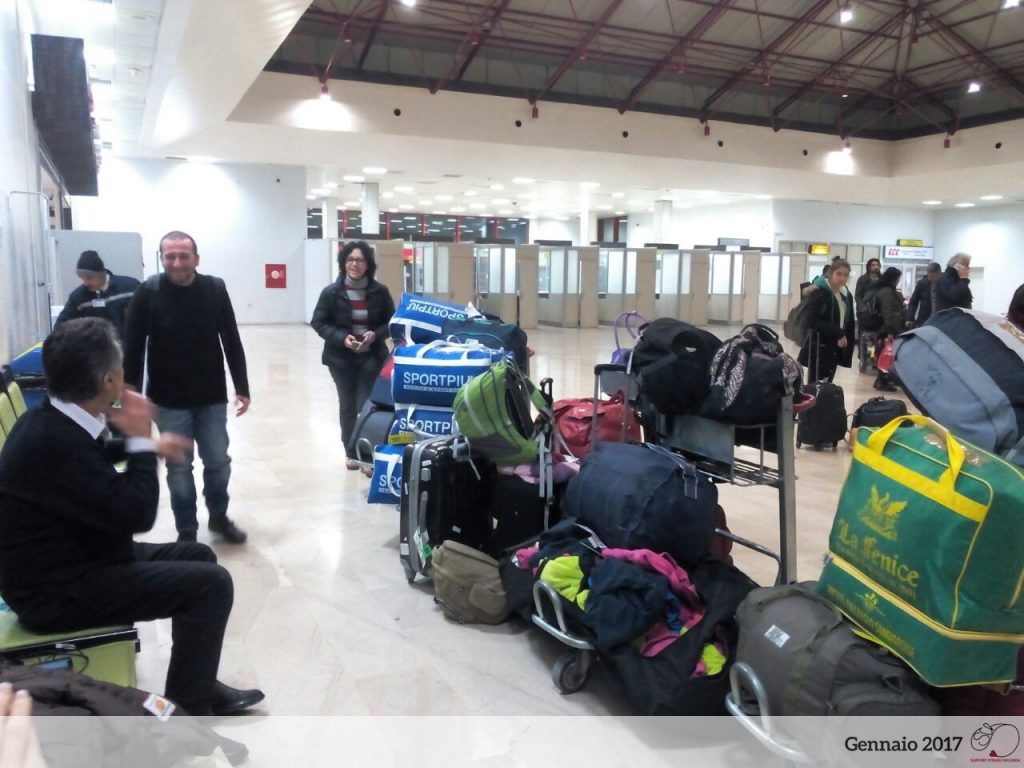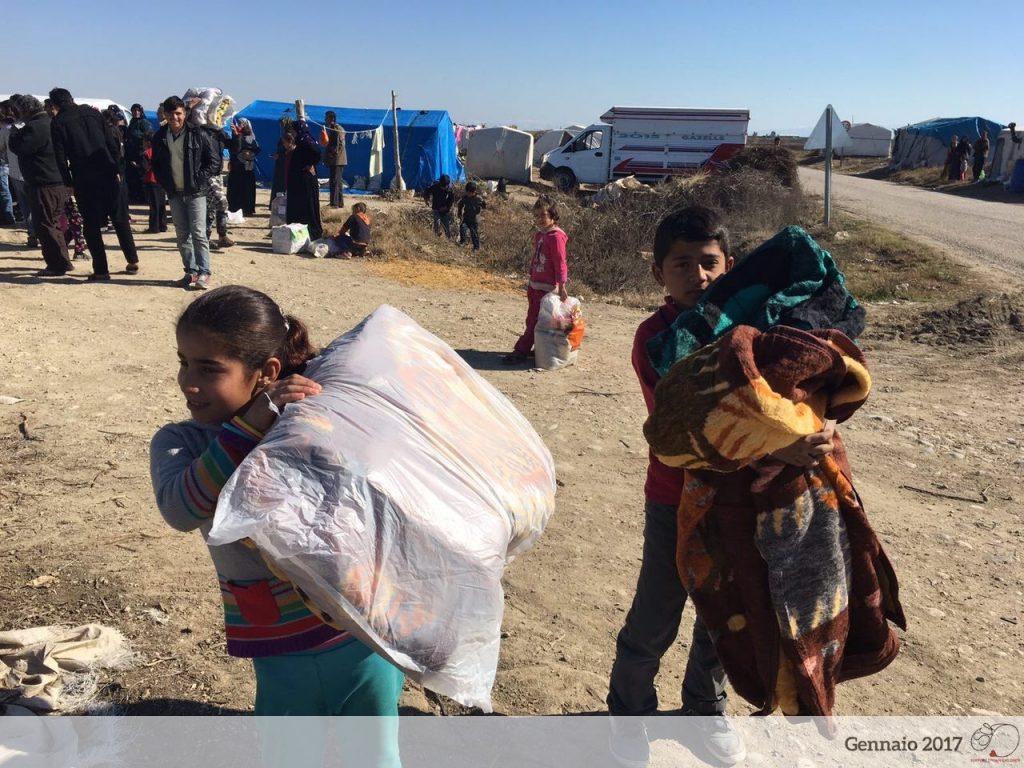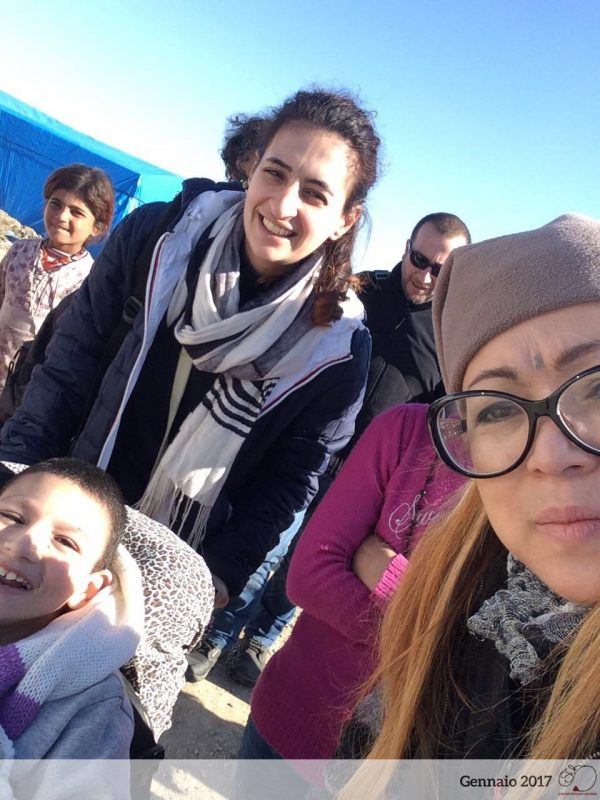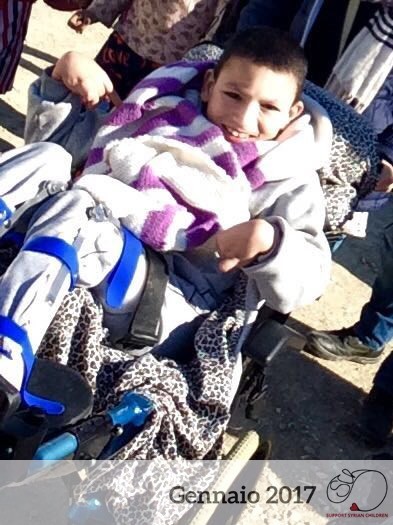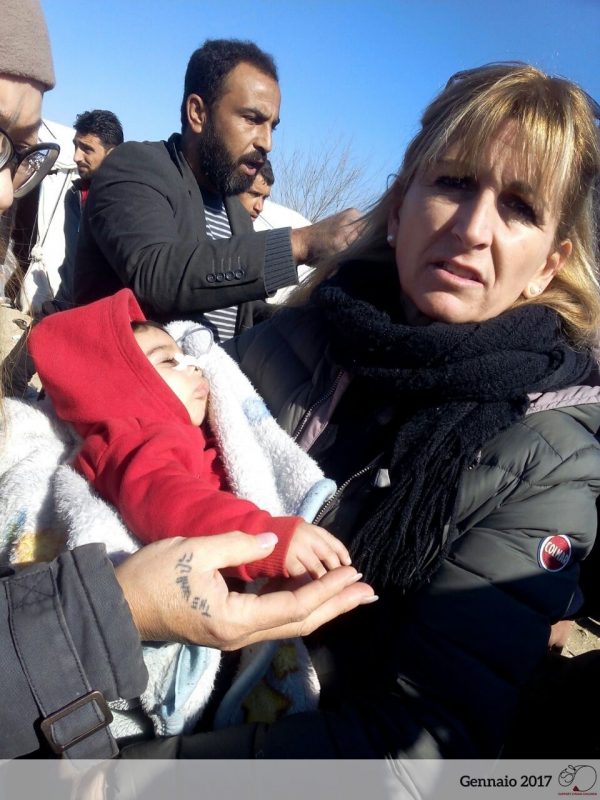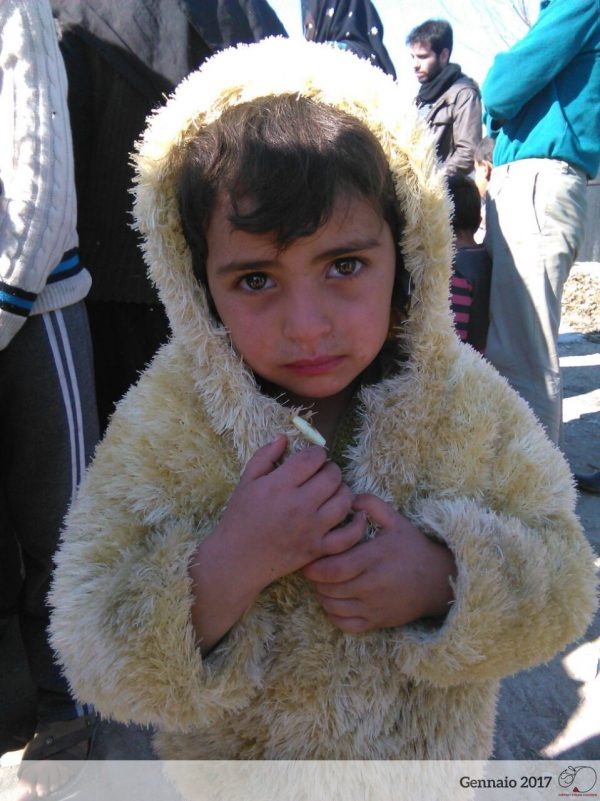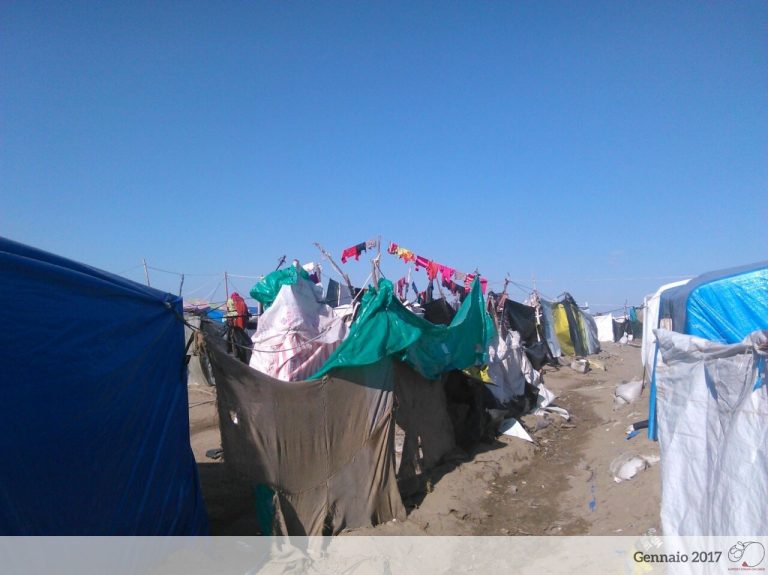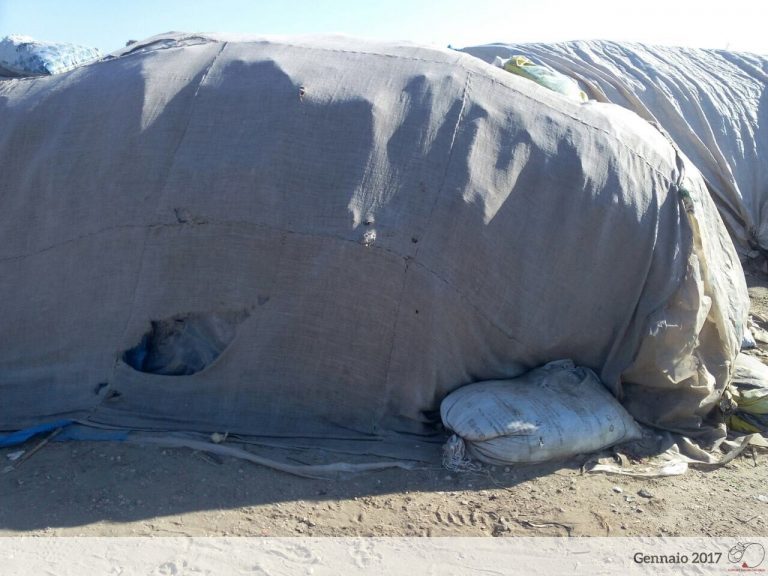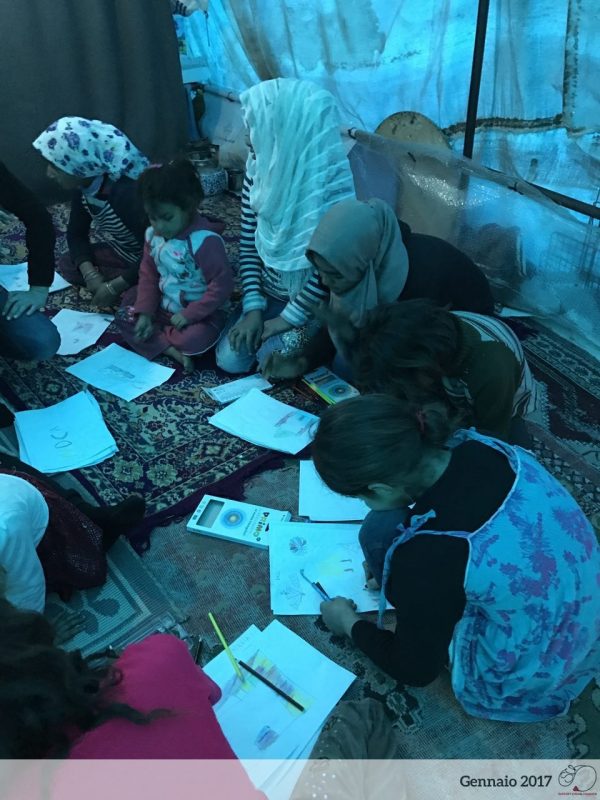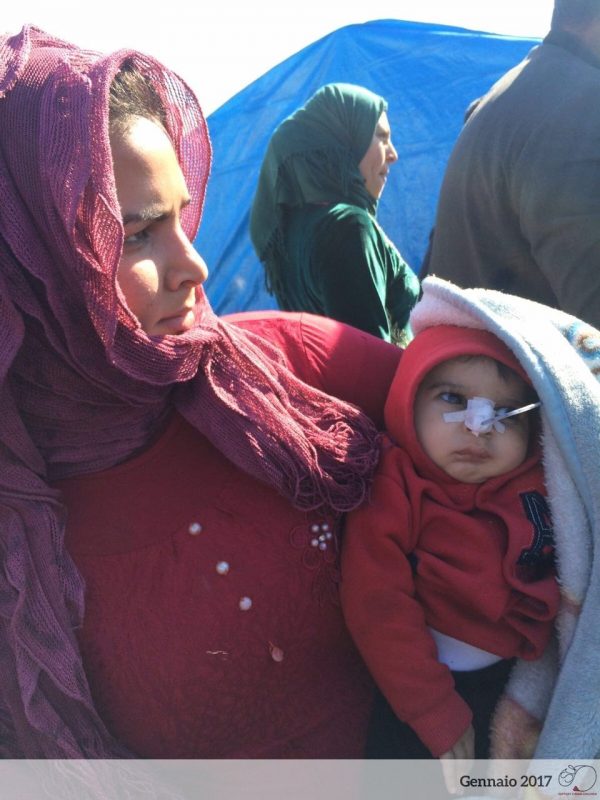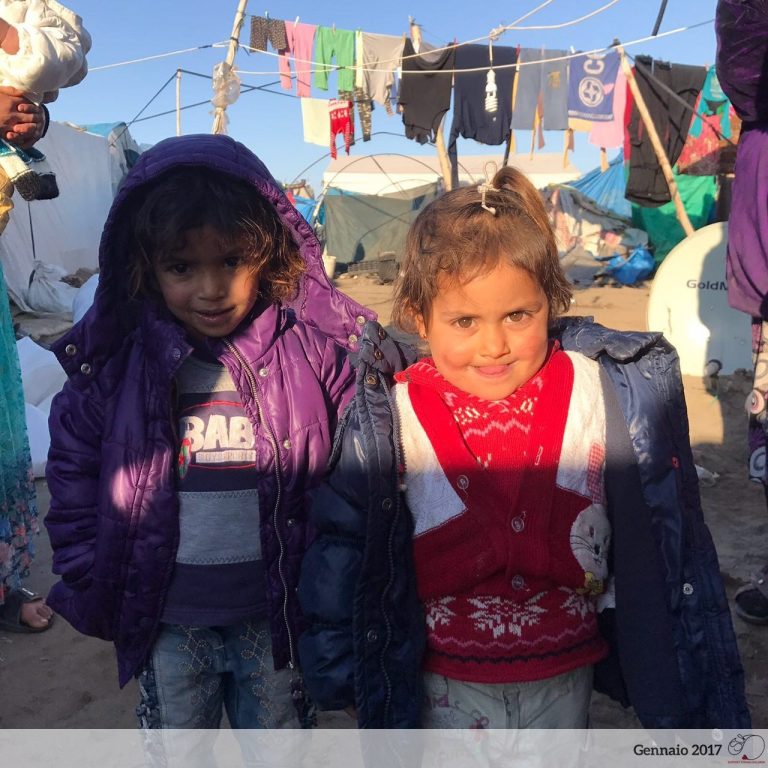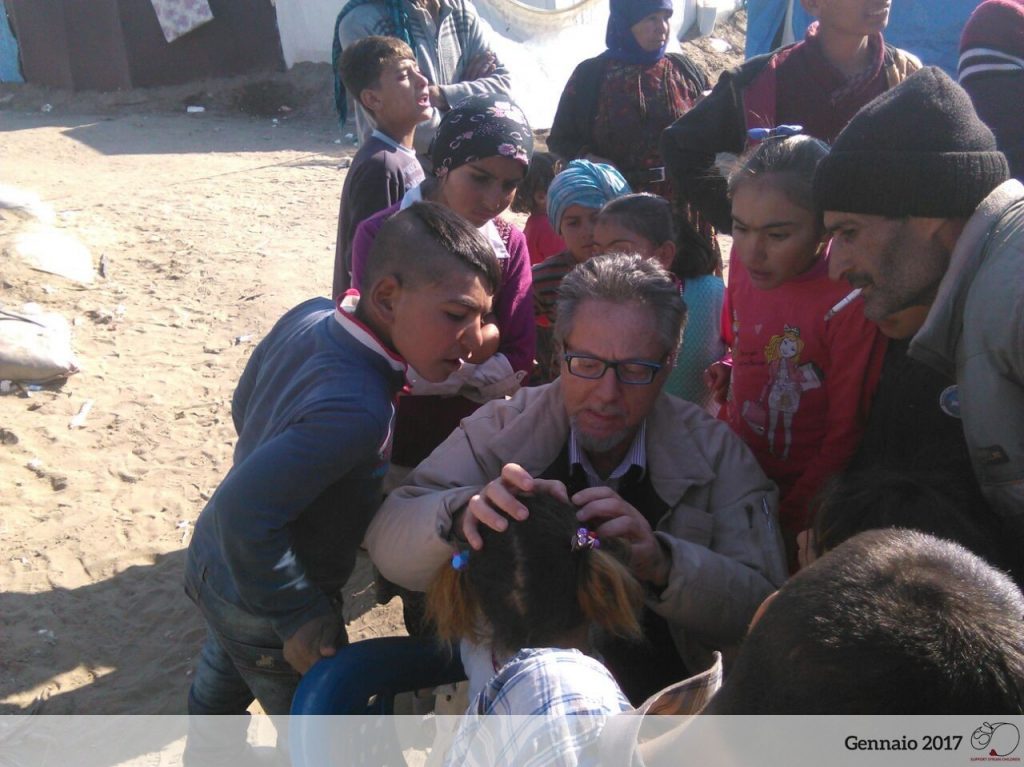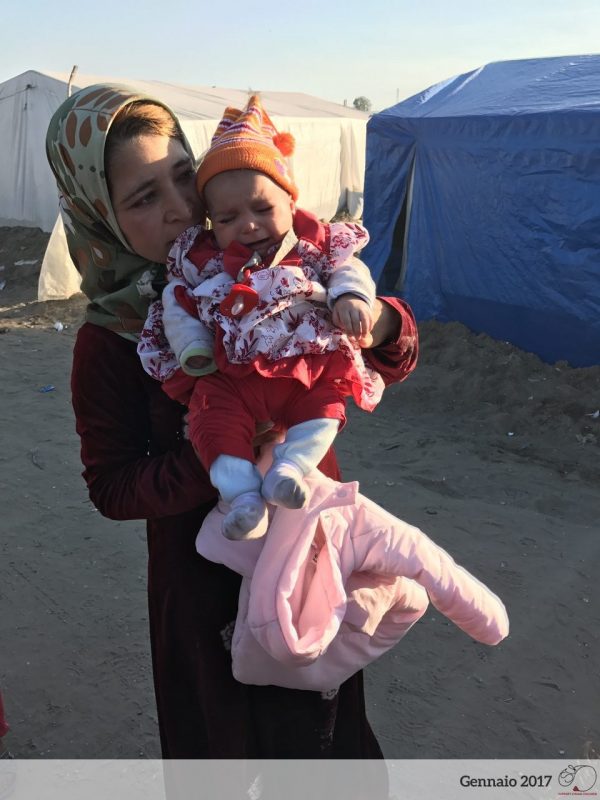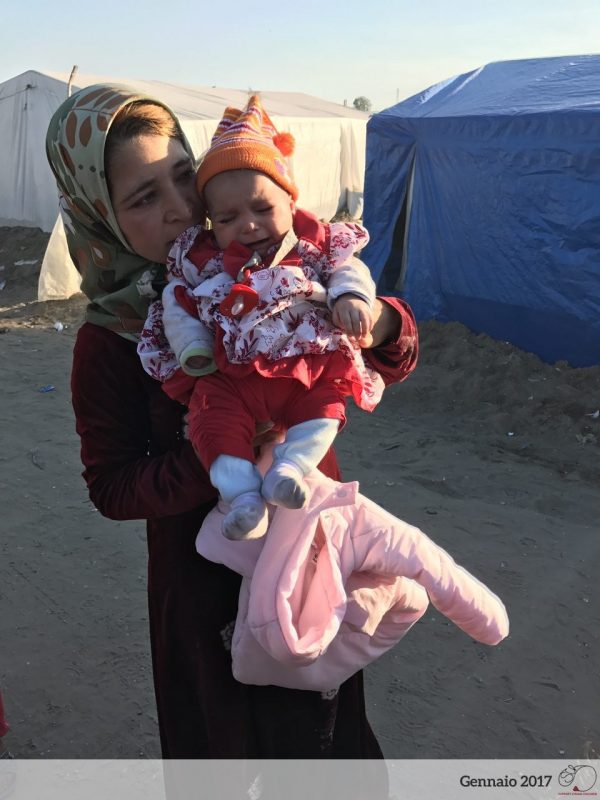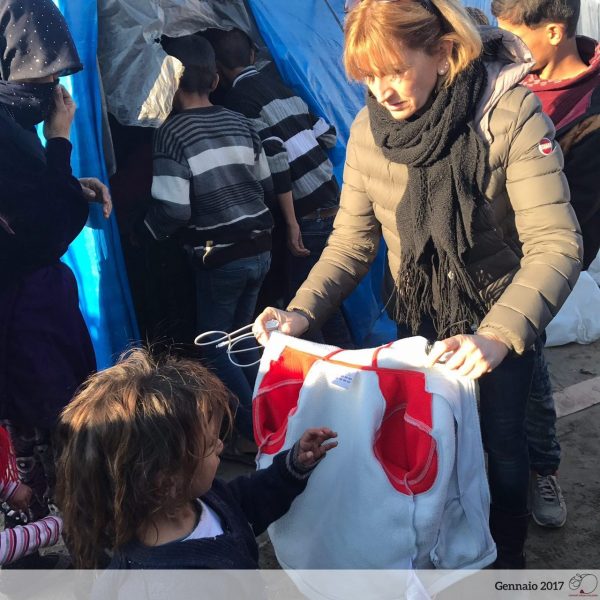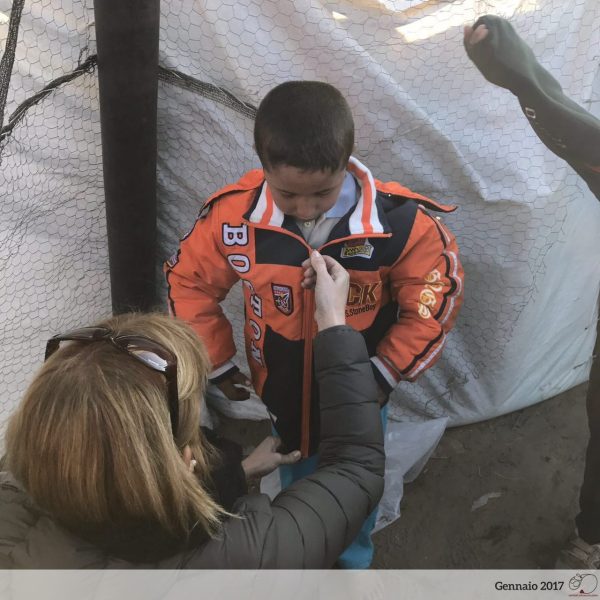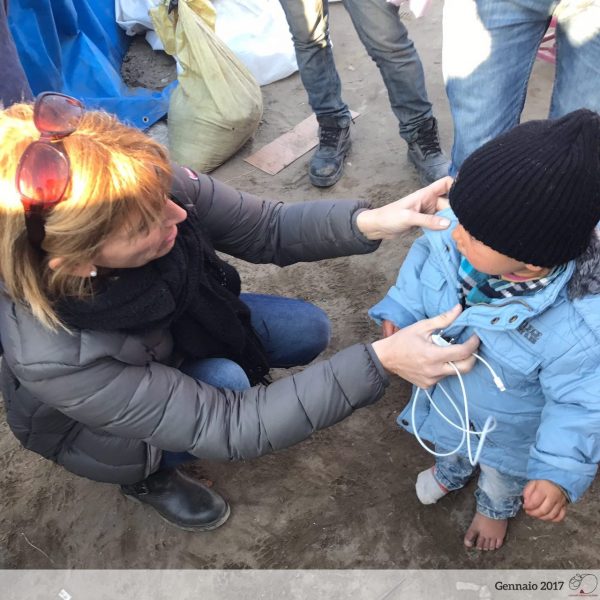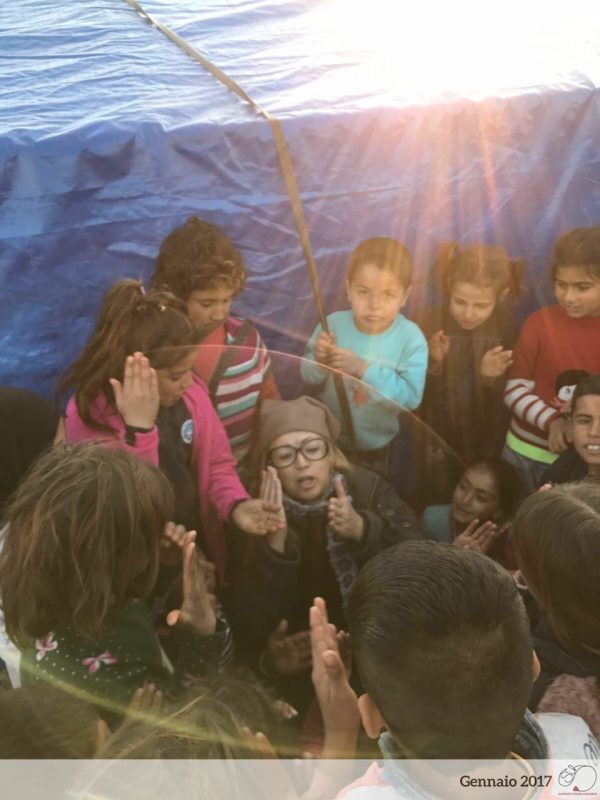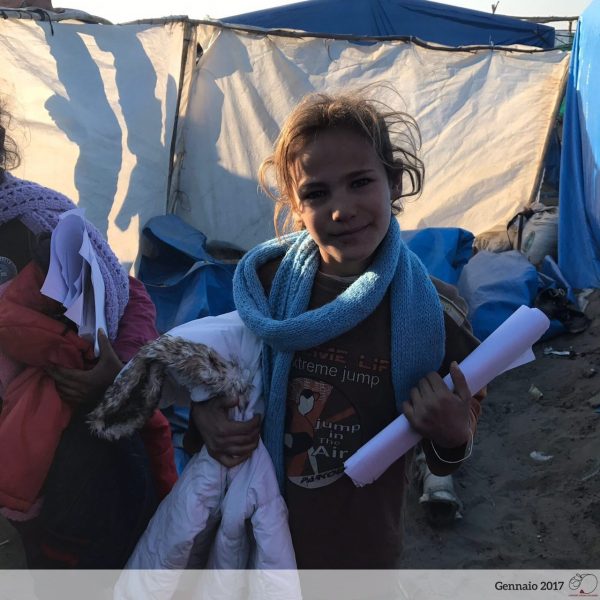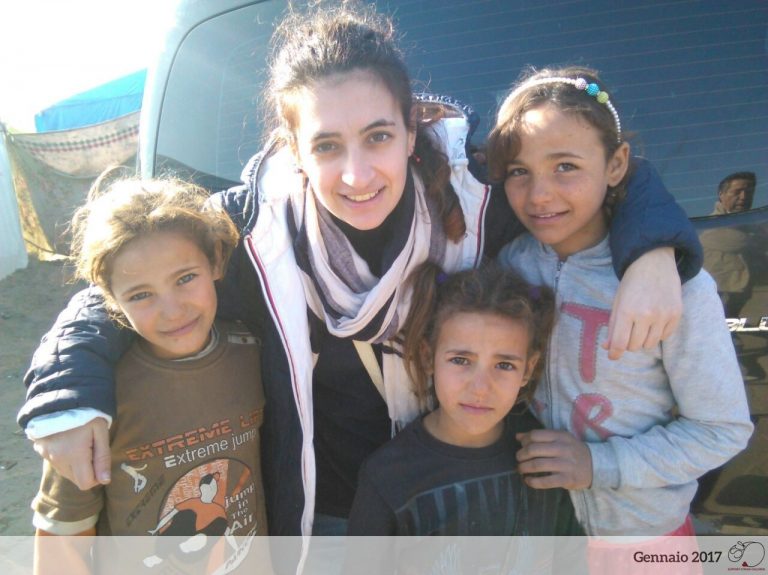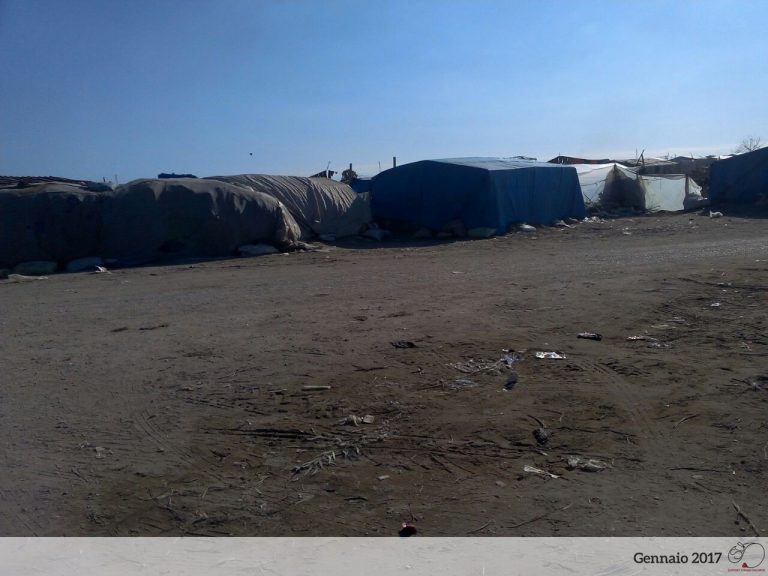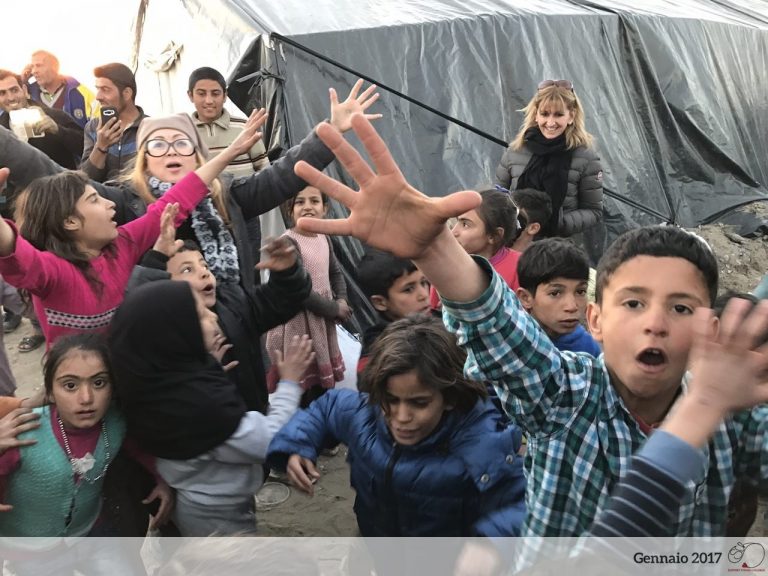The refugees I met are a hymn to life. By Holly Boncoraglio
The departure
Pegasus Airlines thanks. We all met at the airport around 12 o’clock. In this mission there will be 6 of us, Arianna, Stefania, Marja, Andrea, me and Marino. There are a lot of luggage. Each of us had about 5 bags each of 6/8 kilos each, a very precious work done by Maruska, Mariateresa and Margherita.
Having such an amount of luggage was actually our luck at the check-in desk. There were so many that they reserved a desk just for us. The other passengers glanced at us, to say the least, concerned, glad they weren’t the ones in line after us. Once we loaded all the bags we looked satisfied; until someone asked if we had counted the number of bags and we realized we hadn’t. Fortunately, Mariateresa and Margherita had attached tickets to each package with the contents and weight of each single bag written on it! The trip went well, the flights were both on time and we met Marino and Marija at the airport in Adana, in the baggage claim area. We had 6 trolleys so crammed that something fell punctually at every hole and every little descent. Once outside the airport we took our vans. It consisted of two black vans with 7 seats each, beautifully large internally and with dark windows. We loaded them and left, headed for the market, where we would find the food packages ready to take to the camp. The market is actually a garage stacked with a mountain of boxes that our instincts thought were our food packages. Once we got out, Arianna and I looked at each other a little worried: they were boxes of 25 kilos each containing pasta, rice, legumes, oil, butter and sweets for children …. how were we going to carry them? Our vans were already half filled with duffel bags with jackets. Fortunately, one of the employees of the shop who spoke some English was there “by chance” with his white truck. Also by chance the van is roomy enough for parcels. We had no choice, so “by chance” or not we found ourselves having to accept his help. The original plan was to take the food, distribute it to the first camp, then move to the second and distribute it there. In a second time we would go to take the van with the blankets, we would take it to the second camp and distribute it together with the clothes, then we would go back to the first. But with the fact that we had lost so much time, we had to change plans. First go get the van with the blankets and drive it to the first camp, distribute food and blankets. Then go to the second camp, distribute food and blankets in such a way as to leave the drivers free, distribute pail and jackets and then return to the first and complete the distribution.
Fortunately, the driver who drove the blanket truck knew the area, which is located in “the middle of nowhere”. The first camp is inhabited by Kurds and Syrians. In particular I remember a girl with green eyes, Syrian, and the blond girl. The one with the green eyes literally got attached to me during the mission we did in October 2015. I remember she never left me. In the following months I asked Arianna to look for her, but unfortunately she never found her again. I had a diary with me, which I would give to the elder sister of the Kurdish girl (whose name is Fiore, for us); not because I am particularly fond of her, but because she is my age; and like all boys my age I think she needs someone to confide in. Arianna had warned me that she was probably married, so I put a photo in the diary where we are portrayed together with Arianna and Fiore. So, in case I hadn’t found it, I could have given it to her sister, with a lot of affection. This field is more liveable than the second; forces due to the presence of the river, or because it is surrounded by cultivated fields, or perhaps because of the presence of wood to burn the fire. Certainly it cannot be said that they are doing well, but the poverty here is different from the bleak one found in the second field. As soon as we arrived Fiore, who was holding the hand of her younger sister, ran towards us shouting “Arianna”. I remember how this little girl had stuck with me because she always played with the boys, including her older brothers, and she commanded them by rod. While I am immersed in my memories, she comes towards me calling me “Abla” and she hugs me. She probably remembers me too; perhaps because during our first meeting her brother set a chicken on me.
We moved to the left side of the field, where there was a small square. The first distribution took place there. This time we asked for the list of families present, in order to be able to make a more equitable and orderly distribution. Despite this it was not an easy distribution. There was no lack of shoving, nor was there any lack of food since he had not left his name. After the distribution, Andrea and I started wandering around the field. I wanted to take some photos of the objects that would reveal the condition of being a refugee. Andrea also photographed. He reminds me a lot of Sebastiao Salgado. We were walking quietly when I heard Arianna call me. So I went back and saw her holding a baby in her arms. This baby was not older than 2 months, but he had two breathing tubes attached to his nose, was very pale and thin, and barely moved his eyes. In a worried voice he asked me to call Marino. I found him after a few minutes while he was putting a cream against leishmaniasis on a child’s ear. He then let himself be led by Arianna who was holding her baby in her arms. Together we entered the parents’ tent, together with the shop interpreter. In an instant, Marino went from being ironic to being very serious. It took him a few minutes to look up and shake his head imperceptibly. Nothing to do. The baby will soon die. His problem is probably due to birth anomalies that crushed his head. He won’t live long. The interpreter then turned to his parents, telling them that no medicines were needed and they only had to hope in God, inshallah. Arianna corrected him by telling him that there was no hope; but he with his eyes full of tears turned to her saying “I know. But I can’t, I really can’t ”. One by one we walked out of the tent in silence, leaving the desperate crying parents alone. They understood. Fiore was waiting for me outside. I took her aside and showed her the photo of her sister and the little girl with green eyes. I found out that her sister got married (but I don’t quite understand where she went), while my little girl was brought back to Syria.
Then one of the guys asked us if we wanted some chai. We, who were hungry and thirsty, said yes. While they hurried to look for 6 chairs that counted all 4 legs, I took Fiore aside, at Arianna’s suggestion, and took her behind a curtain, where no one could see us. From the backpack I took out the diary and a pencil case and gave them to him. She widened her eyes and opened her mouth. I signaled for silence. I had a present for a child. So she if she hid it in her T-shirt and she turned to go “home” to hide it (at least this is what I marked her to do; I say marked because I don’t speak half a word of Kurdish). But after a few seconds she stopped, she turned and ran towards me. She froze and then she literally jumped on my neck. We both nearly rolled into the river. I still can’t describe the happiness I felt in that embrace. She gave me a kiss and ran away, towards her tent. I went back while Arianna and Marja were communicating with some children. When I say communicate, you are not thinking of linguistic communication, but of bodily communication made up of small gestures aimed at conveying a message. Marja is really fantastic in this. I went for a walk and found Andrea smiling and stroking the face of a child. I walked over and realized that she was talking to a special child. He was a paralyzed and mentally handicapped child. He didn’t speak but emitted some vowels every now and then and clapped his wrists. He was in a wheelchair, a modern one. Yet he had a detail that made him special, and above all that helped us: he smiled a lot. This child was a true hymn to life. As it was he looked around and smiled. If you tried to stroke his cheek, he would close his eyes and try to say something. At that moment I thought about what effect a little music therapy would have on him. While Andrea and I were thanking him for the joy he was giving us at that moment, they called us for tea. But we were too sorry to leave him there alone. Plus he was shivering a little from the cold. Andrea ran to Stefania who was holding one of the scarves to give to the children of the camp. He carried it to the little one and put it on him and the child let out a joyful sound, smiling like a madman and clapping his hands. In order not to leave him there, I took the wheelchair and with Andrea’s help I took him to where they had placed six chairs. As we approached, people came towards us. Marja, Stefania and Arianna leaned towards this child while I was carrying him. Luckily I had Andrea’s help, at some point, because of the holes and the stones I really risked making him fall. I wanted to take it away with me! After tea we left again for the second camp, with the promise made to Fiore and the other children whose names I don’t know and that we would come back with the rest of the stuff. I was very impressed by the patience that both the guys in the shop and the blanket guys showed. We spent more than an hour in that camp, and surely it would have taken an hour to distribute things in the other camp. And they stayed with us, helping us.
After about twenty minutes we arrived in the second camp, where Ali’s family lives. This field is truly bleak. The road to get there is picturesque. But once the road is finished it seems to enter a large landfill, where there is no vegetation, no water and no grass. The ground is sandy and dirty. There is a fountain from which dirty and smelly water comes out. It is full of all kinds of trash cans that the inhabitants burn instead of wood for cooking and to have some hot water for washing. Many tents are made of plastic, completely dilapidated. Most of the children are barefoot, despite the fact that it’s January 29th and it’s really bitterly cold. In this field there are 3 different nationalities, Turks, Kurds and Syrians. I can’t tell them apart, while Arianna, Marino and Andrea who are a little more experienced than me succeed. Here the distribution was different. We put food packages and blankets in a single tent, so as to leave the drivers free who left after helping us unload.
After having stacked the stuff, the head of the camp called the families who were also marked here on a list, while Stefania and I tried to keep the children good. It is sad to see children fighting to get into the tent and take some food; at one point I got furious with someone brandishing a stick and hitting children. I couldn’t insult him, if it wasn’t that I didn’t know the language, but I yelled at him in Italian to stop it. This man looked at me terribly and also answered me sourly. He is probably not used to seeing a woman, moreover young, taking a stand against him, but I don’t care: if I’m there you don’t have to dare to touch a child. So I turned to look for Arianna to ask if we could send him away. But I couldn’t find it. So I asked around where she was, until Marja told me that she had been taken to a part of the camp by some people. Together we agreed that if she didn’t come back soon we would go looking for her. In reality there was nothing to worry about, because she returned shortly afterwards towards the end of the distribution. She explained to us that she had been in a very poor part of the field, where aid does not arrive. There are several orphans there, among which she recognized a little girl we had seen in October 2015 and who we were told was dead. I remember this little girl well, she was cross-eyed and completely undernourished, as well as an orphan. We had left a woman, who had another child, some powdered milk and asked her to give it to the little girl. I felt almost guilty, because I knew I had forced her to choose between her son and the other child. In fact, a few days later we were told that she was dead. I was so happy when Arianna told us that not only she was alive, but she even had a pair of glasses, that I picked up a 7-year-old girl who had been attached to me since our arrival. I held it tight, happy that every now and then some miracle really happens. And in my heart I thanked that woman for her generosity. After the distribution, we set up 3 tents and shared the tasks. In a tent, Stefania and Marja would have done their work of elaborating the trauma through the drawing. The second tent, on the other hand, would have been the place where Marino could visit and treat children with the help of Ariadne. Andrea and I would have managed the third tent for the distribution of the jackets. The drawing workshop for trauma processing was really intense and painful, but certainly very important. Stefania asked the children to design a safe place. Almost no one has succeeded. On the drawings only bombs, people lying on the ground, houses on fire and tanks. Marino diagnosed 3 heart diseases, a boy who was missing a bone in his arm (and it was really impressive to see this arm bent in a totally unnatural way), some leishmaniasis and intestinal diseases due to totally dirty water. Our interpreter was constantly called from one side to the other, and he did a really good job.
Andrea and I managed well even without an interpreter. He came with us at the beginning to explain to some boys who were helping us to distribute to put all the bags in a tent, let 3 children in at a time, give them clothing and then let them out. I was inside the tent that I was helping to distribute, while Andrea was outside handing me the bags and keeping an eye on the situation. Outside the tent there was a throng of people who pushed incessantly. I remember very well that in October 2015 when I had to distribute the games they literally attacked me and destroyed a part of the tent. These children really have nothing, and their enthusiasm is more than understandable. Overall the distribution went well. Almost everyone has had something. I was reminded of a father who always held his little girl in his arms who had an infection on one foot and could not walk. Although he was a man he did not take advantage of either his stature or his strength. He waited silently outside the tent, letting the other children overtake him. When I realized it, I thought it was my duty to bring something to that little girl, so I took a small jacket and took it out for her. The man made me a bow and I realized that he was very thin. I had no food to offer him, so he gave him a can of iced coffee that the owner of the shop in Adana had given me.
Overall the distribution went well. Almost everyone has had something. I was reminded of a father who always held his little girl in his arms who had an infection on one foot and could not walk. Although he was a man he did not take advantage of either his stature or his strength. He waited silently outside the tent, letting the other children overtake him. When I realized it, I thought it was my duty to bring something to that little girl, so I took a small jacket and took it out for her. The man made me a bow and I realized that he was very thin. I had no food to offer him, so he gave him a can of iced coffee that the owner of the shop in Adana had given me. In the meantime, Arianna joined me and helped us distribute some jackets and freed Andrea that she was able to continue photographing. Once we finished with the distributions, we were joined by Stefania and Marja. Marja, a street artist, has started to entertain children. It was a beautiful sight. The little ones laughed, shouted and danced, followed and imitated her, looking at each other with cheerful and full of life eyes. Even the adults and some kids who were about my age gathered nearby, intrigued by the laughter and screams that could be heard throughout the field.
While we waited for Marino, the air became colder and colder as the sun set. So I tried to learn the names of those children who had spent the afternoon following me. I. I told them that I spoke Italian and English, so some of them started counting “one, two, three ..” until 7. After 7 there was absolute emptiness. So we sat on the floor and started repeating the numbers, up to 10. At a certain point a blonde girl looked at me and said “Abla, love”; we all hugged in a very tight hug, one of those group hugs made not for facade, but to show ourselves that we really loved each other. Then we sat down on the ground and said our country of origin. In this group of children there were Turks, Syrians and Kurds. It was nice to see them all together, playing and laughing. When Marino joined us it was almost dark, and we still had to distribute jackets in the first field. Just before getting into the car we said goodbye to Alì’s family. The older girl, Majada, began to cry as she greeted Arianna. Instead the smaller one held tight to Marino, and she smiled. Before leaving we all turned, us and them, towards the tents. Above the awnings the sun was sinking completely, leaving heart-warming shades in the sky. Only once in my life have I experienced such a painful farewell. I got into the car with Arianna, Marja and the interpreter. He is a Syrian with a degree in archeology who has been living and teaching about Turkey for a long time. In the other car, on the other hand, there were Marino, Andrea, Stefania and a family with a disabled child for whom we bought a pram. As the van drove I was standing in the back trying to empty as many bags as possible and stuff the clothes into one bag. As it was dark we had little time, and we would just leave all our stuff in a tent and each of them would come in and get what he needed. Once back in the first camp, we took the bags that I had filled and carried them to the tent. As soon as Fiore saw us arrive, he ran into it. He helped Arianna and me carry a sack (which was taller than me), and then he shook hands with us. The sky was beautiful, a shower of bright stars above our heads. It was really freezing cold, and yet most of them were barefoot. The time to get back in the car was the worst for me. Why return to Italy where the most exciting moments were the arguments in the Department Council or the organization of cultural events? At that moment I just couldn’t find a valid reason that would allow me to say “how nice to come home”. I already feel the lack of racing and unexpected events, as much as of Fiore’s hug. Before getting into the car he joined me, hugged me tightly and gave me a kiss.
I would like to conclude with a brief reflection on hunger and cold. Peter Hoeg, in his autobiographical book “The Almost Suits”, says that when he imagined what it was like to have a family, he thought of a warm house and a table with lots to eat. It is curious how talking to refugees, the first thing they remember is not what they did before the war or how they dressed, but what they ate and how. For example, one person told me that there was always yogurt. As for the cold, I don’t really know how they can handle it. I hate deeply and hate the cold. When there is fog or stupid drizzle, I even feel like crying. And I can’t stand the snow. A few weeks ago there was snow and rain in the fields; they destroyed the tents and flooded the camp. I believe these people have incredible inner strength. I really admire them for how they deal with their situation, for how they continue to build a life without waiting for it to pass over them passively. The refugees I met are a hymn to life.
